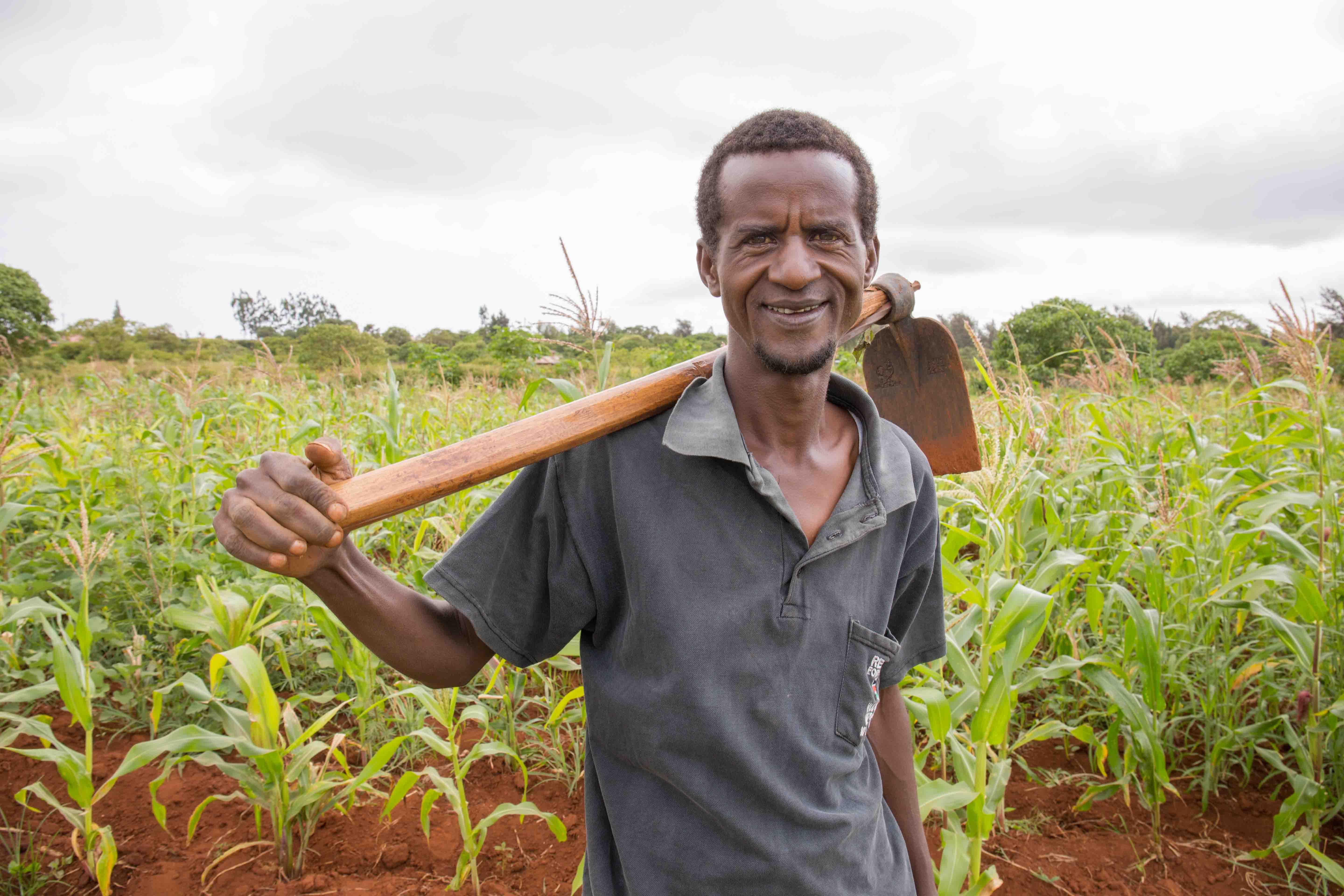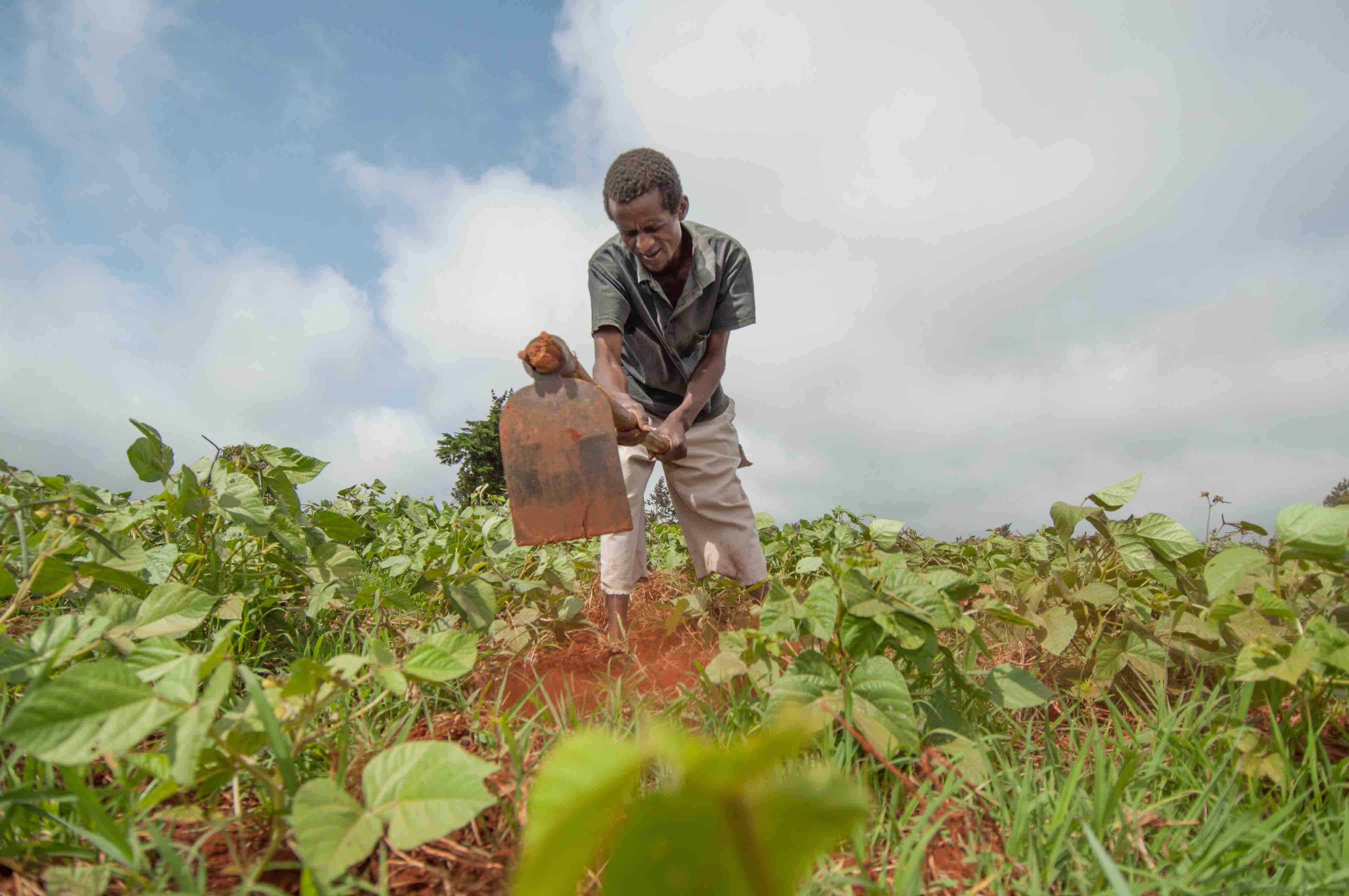UK Aid Match: Where the money goes

CAFOD communications officer, David Mutua in Nairobi writes on an incredible project in northern Kenya that is supporting hard-working families there to make a living. Thanks to your donations during Lent last year, which were matched by the UK government, the people in this small community are turning their lives around.
Just after daylight at Darakabicha location, Marsabit County, northern Kenya, Mahamoud bids good day to his wife. He grabs his watering can and hoe and begins the two kilometre walk to his farm. He makes his way through the lifting fog and braving the chilly morning, resolute that no matter the weather he will make the best of the day. Mahamoud finished high school but with no money to pay for further education, he resorted to the family’s way of life, farming.
Support people like Mahamoud around the world
Marsabit, the largest county in Kenya is located about 600km from Nairobi. The county is one of the driest areas in Kenya receiving an average precipitation of 254mm. Due to the harsh climate of the region about 80% of the people are nomadic pastoralists, 10 per cent are small scale farmers and about 10% engage in retail business. Over the years the area has been plagued with drought that has had adverse effects on the area.
Drought devastating lives
Lack of water means that people have to walk long distances in search of the precious commodity and as a result farming has been affected. Inconsistent rainfall has impeded on the ability of farmers to get a good yield.
Mahamoud is a small scale farmer and he values his land a lot. “The most precious possession I have in my life is this one acre piece of land. From the time I was born, I found my parents farming and it is through farming that I was able to go to school therefore I cherish it very much. I plant beans, maize and green grams which I use to feed my family. The surplus especially green grams, earn me good money at the market. My farm is my greatest joy.”

His greatest joy and source of livelihood has also brought great distress to him. “One of the main challenges I face is little rain. When we plant and the rainfall is not sufficient, the seeds do not germinate. Since the nearest water point, a dam, is about 4 kilometres away, it takes me a long time to go fetch the water and come back. By then the sun is usually very intense.” After working extra hard to ensure that he waters his crops, pests and moles have attacked his farm. “Moles burrow and eat the roots of the plants thereby causing them to die. Insects feed on the buds of flowering plants stunting the crops growth.”
Mahamoud has had mixed fortunes during past harvest seasons since he used old traditional methods of farming, passed down to him by his father. This has subsequently changed from the beginning of the year after meeting with CARITAS Maralal Disaster Risk Reduction officer, Bante Galgalo.
40 farmers coming together to tackle drought
“I met CARITAS Marsabit Bante Galgalo and his team when they were looking for groups of small scale farmers to support. They found our group of forty farmers and offered to help and train us. As a group we had a demonstration farm which they came, saw, and started offering training on new and improved modes of farming. Individually, they ploughed for each of us an acre. This inspired me a lot and I increased my farming acreage to two. On top of that, they gave us green gram and maize seeds that do not need a lot of water and can thus survive in this area. We were also given hoes, rakes and watering cans as a group and whenever someone is in need of them they can borrow from the group, use and return.”
[youtube https://www.youtube.com/watch?v=Pw0xk6eesu4]
The group was also trained on the importance of pesticides as well as how to use them. “From the day we learnt how to apply pesticides, I have seen a great improvement on my farm. Many insects and pests now do not attack them and I expect a good harvest this time around.” Mahamoud said as he tended to his patch of green grams.
Bante Galgallo, the Match Fund 3 program officer at Caritas Marsabit attests to the improvement of Mahamoud’s farm. “When we started, his farm had been attacked by insects that chewed on the leaves and buds of the plants but since he started using the insecticides there has been great improvement. This is but one of the testimonies of the over 32,000 beneficiaries in the project.”
A donation today won’t be matched, but will change lives
The key farming lesson that Mahamoud has adopted from the four lessons that they so far have had is the importance of proper seed sowing. “We used to practice, what we came to learn was called broadcast planting. We would throw the seeds and where they landed they would grow. During the training session we were taught on the importance of planting in a straight line so that the plants, be it maize ore beans, have enough space to grow.”
According to Mahamoud, the project is of vital importance in the community as it addresses the issue of food insecurity. “As a farmer, father and husband, this project ensures that I can put food on the table for my family. Their help in ploughing an extra acre for me has given me renewed vigour to farm even harder as I can now have a much bigger harvest. ”
Mahamoud looks forward to the first harvest since receiving the training. “I plan to sell the surplus and support my wife’s small tailoring business. I also want to ensure that there is money for my children’s school fees as well as save some for any medical emergency. Farming one acre ensured that my family had food but now with the two acres I am assured I will have excess and that is all thanks to the Caritas Marsabit team. To the funders we would like to let you know that your funds are being utilized very well. The Caritas team has fully supported us in everything and we are very grateful. We, and even our families are very appreciative to all of you.”
You raised over £5 million during Lent last year. The UK government also matched this amount with £5 million, meaning you helped to ensure an incredible £10 million went to help the poorest families around the world.
Reblogged this on Miss Alexandrina.
Reblogged this on Miss Alexandrina.